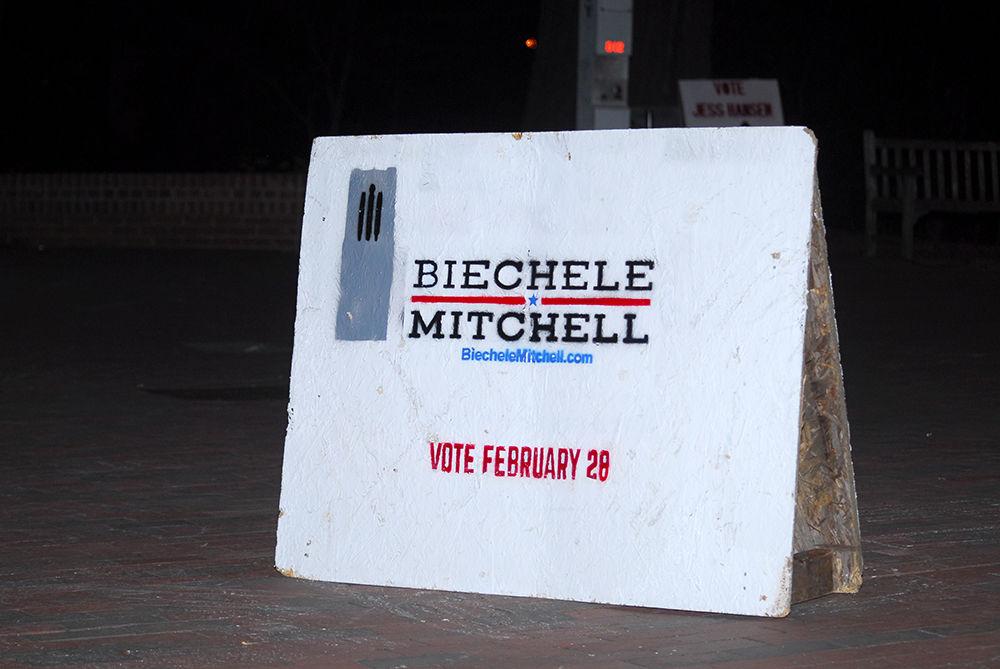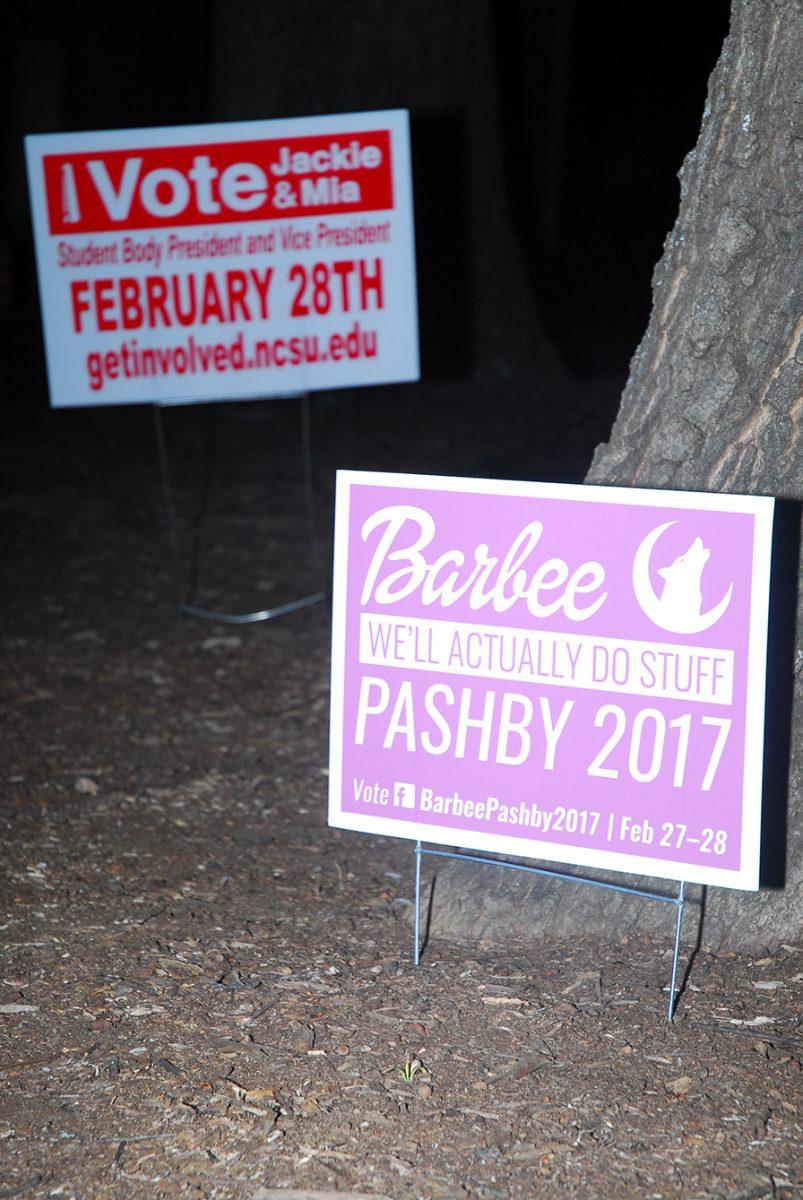Campaigning for student body president and vice president is a week-long process that is taxing yet potentially rewarding for the candidates involved. Candidates used a variety of means to reach out to voters, including handing out business cards, meeting with student organizations and using social media.
Student body presidential candidate Brad Barbee, a junior studying statistics, said his campaign was mainly focused on getting face-to-face interaction with the students.
“We feel like just handing out flyers and stuff is really not effective,” Barbee said. “We really like to go around and try to find people sitting out on a bench and talk to them. Say ‘hey, what do you want to know about, talk about’ and really prioritizing and focusing on tailoring our conversations to want those students want to hear, because we have a general platform, which is great, but we really want to find out what the issues are that the students care about and talk about those. So that’s kind of what we’ve been doing for the past couple of days in the Brickyard, Wolf Plaza area, Stafford Commons as well.”
For Alberto Quiroga, a student body presidential candidate and senior studying aerospace engineering, his campaign is making sure students understand their platforms and know what they are voting for.
“We’ve just been hitting hard on advertisement,” Quiroga said. “So just making sure the students know what our platform is, what our message is, trying to get to the students, and just telling the people close to us to spread the news. First, obviously it’s getting the name out there, whether it’s sandwich boards or the huge life-sized poster we have outside. But most of the time, we mostly care the students know what our platform is and that they are not voting blindly and that they know this is what we stand for and that we make sure we’re representing all students.”
Meredith Biechele, a student body president candidate and senior studying mechanical engineering, conducts much of her campaign on social media and makes speeches at meetings with clubs and other campus organizations.
“Now in the last few days leading up to voting, we’ve been out and about a lot more,” Biechele said. “Tabling in the Brickyard and Wolf Plaza mostly.”
In contrast to previous years, candidates have three additional days to campaign. Jackie Gonzalez, a student body president candidate and a junior studying political science, said the extra days helped with keeping candidates well-rested.
“It feels long just because we can’t spend 24 hours of our day out here as much as we want to,” Gonzalez said. “We have to make sure that we are on top of our school work, the team especially. We also have to realize that with these extra days we can’t go over too much because of the stress and our mental wellness. We can’t just go all out every day.”
This election was not the first time the length of the campaigning period was changed, stated Mia Connell, sophomore studying sociology and Gonzalez’s running mate.
“Last year, it was only seven days, as well as it was for the first-year senator elections,” Connell said. “So for the past few years, it’s been seven days. It used to be a total of two weeks, then they shortened it to one week, and the reason is candidates would skip their classes, go to all these organization meetings and in two weeks, there are probably a fair amount of tests, like I know I’ve had two papers and a midterm along with just general assignments and a quiz, so candidates were quite literally failing because of campaign week. So they shortened it to one week, and this is the first time they’ve lengthened it to 10 days.”
In addition to campaigning, many campaigns also dealt with issues concerning campaign violations.
Candidates accused of campaign violations receive a violation notice and have to present their case in front of the Board of Elections. There, the candidates may have their violation dismissed, receive a notification which states that they made all efforts not to break a rule or receive a warning, which is issued when candidates violate a more significant rule. Three warnings are an automatic disqualification hearing.
For the Quiroga-Lennon campaign, this is worrying as they already have two warnings. Jayna Lennon, a student body vice presidential candidate and junior studying political science, mentioned some campaigns have been focused on reporting violations more than others.
“We have not been so much concerned with reporting people for violations,” Lennon said. “I think when I see some of the signs messed up I’ll usually just fix it, if I can. But we have had quite a few violations against us, and it’s just really inconvenient because you have to take the time to gather all of your evidence, to make a case and then actually go into the hearing. It’s just a lot of additional stress on the campaigning process.”
While Lennon believed that the rules of the Board of Elections were extremely important and that their campaign made great efforts to follow them, sometimes the circumstances leading to a violation are unavoidable.
“To be pulled into that whole process because of something small like that does get a little bit much after so many times, because we’ve gone in for quite a few hearings at this point and we do have two warnings right now which is definitely not ideal,” Lennon said. “It’s interesting how people approach it differently. I know some campaigns have been very much like we have, let’s just help each other out, but there’s definitely been people obviously who are more into reporting. So it’s a different dynamic.”
Other campaigns also took to issue with some the ways violations were being reported. Barbee, who will have three campaign violation hearings Monday, was unhappy with the violation reporting process of one campaign in particular.
“There’s really one campaign in particular that has used the strategy of trying to report every single little tiny thing that they can and kind of using the wording of the election handbook in ways that it is not very purported to report violations,” Barbee said. “What happens is you have to go into a hearing every time that a violation is reported. It takes time away from campaigning, it takes time away from me talking to students, for really stuff that at the end of the day, will always be dropped. I’m not really happy about that with one of the campaigns this year. I feel like my campaign, that’s not one of the strategies we use. I know another campaign; that’s not the strategy they are using. It’s really a dirty strategy.”
Alex Mitchell, the vice president candidate running with Biechele and a junior studying meteorology, stated that campaigning was not any easy process, and it was something candidates had to be ready for.
“I think it’s something that you should physically and mentally be prepared for,” Mitchell said. “I think when you’re campaigning a lot of times you infer things that are not necessarily true, you hear things from other people that may not necessarily be true as well and that can sometimes interfere with what you’re actually doing — progressing through your campaign.”
Biechele agreed, as she found the campaign process exposed a lot about people’s true natures.
“I really believe that this process, the outcome doesn’t really define who you are but rather reveals who you are, what your values are,” Biechele said. “It’s been a huge challenge for what we stand for as students and what we chose to fight for.”
Elections open Monday at 8 p.m.
Signs placed at Tucker-Owen Beach advertise the candidates for student body president and vice president on Sunday. These signs can be spotted all around campus as four candidate pairs run for the offices of student body president and vice president. The election will take place Tuesday.









